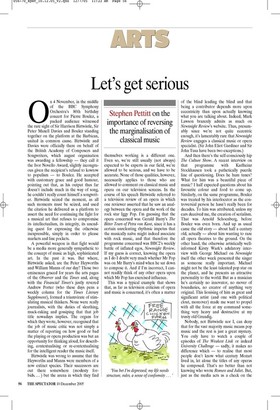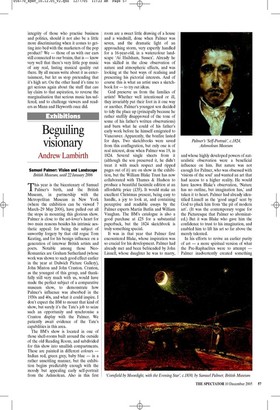Let’s get serious
Stephen Pettitt on the importance of reversing the marginalisation of classical music
On 4 November, in the middle of the BBC Symphony Orchestra’s 80th birthday concert for Pierre Boulez, a packed audience witnessed the rare sight of Sir Harrison Birtwistle, Sir Peter Maxell Davies and Boulez standing together on the platform at the Barbican, united in common cause. Birtwistle and Davies were officially there on behalf of the British Academy of Composers and Songwriters, which august organisation was awarding a fellowship — they call it the Ivor Novello Award, slightly incongruous given the recipient’s refusal to kowtow to populism — to Boulez. He accepted with customary grace and good humour, pointing out that, as his output thus far doesn’t include much in the way of song, he couldn’t really count himself a songwriter. Birtwistle seized the moment, as all such moments must be seized, and used the citation he delivered as a platform to assert the need for continuing the fight for a musical art that refuses to compromise its intellectualism, its integrity, its unending quest for expressing the otherwise inexpressible, simply in order to please markets and line pockets.
A powerful weapon in that fight would be a media more generally sympathetic to the concept of music as high, sophisticated art. In the past it was. But where, Birtwistle asked, are the Peter Heyworths and William Manns of our day? Those two eminences graced for years the arts pages of the Observer and the Times and, along with the Financial Times’s justly revered Andrew Porter (who these days pens a weekly column for the Times Literary Supplement), formed a triumvirate of stimulating musical thinkers. None were really journalists, with the duties of sleuthing, muck-raking and gossiping that that job title nowadays implies. The organs for which they wrote, however, recognised that the job of music critic was not simply a matter of reporting on how good or bad the playing or opera production was but an opportunity for thinking aloud, for describing, contextualising or re-contextualising for the intelligent reader the music itself.
Birtwistle was wrong to assume that the Heyworths and Manns were members of a now extinct species. Their successors are out there somewhere (modesty forbids... ) but the arena in which they find themselves working is a different one. Even so, we’re still usually (not always) expected to be experts in our field, we’re allowed to be serious, and we have to be accurate. None of those qualities, however, necessarily applies to those who are allowed to comment on classical music and opera on our television screens. In the course of his speech Birtwistle referred to a television review of an opera in which one reviewer asserted that he saw an analogy between the opera and the work of the rock star Iggy Pop. I’m guessing that the opera concerned was Gerald Barry’s The Bitter Tears of Petra von Kant, since it has a certain unrelenting rhythmic impetus that the musically naïve might indeed associate with rock music, and that therefore the programme concerned was BBC2’s weekly battle of inflated egos, Newsnight Review. If my guess is correct, knowing the opera as I do I doubt very much whether Mr Pop was on Mr Barry’s mind when he sat down to compose it. And if I’m incorrect, I cannot readily think of any other opera upon which Mr Pop has exercised influence.
This was a typical example that shows that, as far as television criticism of opera and music is concerned, it’s often a matter of the blind leading the blind and that being a contributor depends more upon eccentricity than upon actually knowing what you are talking about. Indeed, Mark Lawson brazenly admits as much on Newsnight Review’s website. Thus, presumably since we’re not quite eccentric enough, it’s lamentably rare that Newsnight Review engages a classical music or opera specialist. (Sir John Eliot Gardiner and Sir John Tusa have been two exceptions.) And then there’s the self-consciously hip The Culture Show. A recent interview on that programme with Karlheinz Stockhausen took a pathetically puerile line of questioning. Does he hum tunes? What for him was a beautiful piece of music? I half expected questions about his favourite colour and food to come up. Similarly, on the same programme, Boulez was treated by his interlocutor as the controversial person he hasn’t really been for decades. To him was attributed, unless my ears deceived me, the creation of serialism. That was Arnold Schoenberg, before Boulez was even born. And up as usual came the old story — about half a century old, actually — about him wanting to raze all opera theatres to the ground. On the other hand, the otherwise artistically wellinformed Kirsty Wark’s adulatory interview with George Michael on Newsnight itself the other week presented the singer as someone really important. Michael might not be the least talented pop star on the planet, and he presents an attractive personality to the world. But as a musician he’s certainly no innovator, no mover of boundaries, no creator of anything very original. This lionising of him as great and significant artist (and one with political clout, moreover) made me want to propel with all the force at my command something very heavy and destructive at my trusty old Grundig.
Nobody, not Birtwistle nor I, can deny that for the vast majority music means pop music and the rest is just a great mystery. You only have to watch a couple of episodes of The Weakest Link or indeed University Challenge — sadly, it makes no difference which — to realise that most people don’t know what century Mozart lived in, let alone the titles of any operas he composed. That’s no better than not knowing who wrote Romeo and Juliet. But, just as the media acts as a check on the integrity of those who practise business and politics, should it not also be a little more discriminating when it comes to getting into bed with the marketers of the pop product? We — those of us with our ears still connected to our brains, that is — know very well that there’s very little pop music of any real, lasting musical quality out there. By all means write about it as entertainment, but let us stop pretending that it’s high art. On the other hand it’s time to get serious again about the stuff that can lay claim to that aspiration, to reverse the marginalisation that serious music has suffered, and to challenge viewers and readers as Mann and Heyworth once did.


























































 Previous page
Previous page